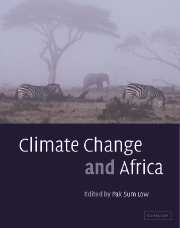Book contents
- Frontmatter
- Contents
- Notes on contributors
- Peer reviewers
- Editor's note
- Foreword
- Foreword
- Foreword
- Foreword
- Preface
- Preface
- Preface
- Preface
- List of abbreviations
- List of SI prefixes
- List of unit abbreviations
- List of chemical formulae
- Part I Science
- Part II Sustainable energy development, mitigation and policy
- Part III Vulnerability and adaptation
- Part IV Capacity-building
- Part V Lessons from the Montreal Protocol
- Index
Foreword
Published online by Cambridge University Press: 10 December 2009
- Frontmatter
- Contents
- Notes on contributors
- Peer reviewers
- Editor's note
- Foreword
- Foreword
- Foreword
- Foreword
- Preface
- Preface
- Preface
- Preface
- List of abbreviations
- List of SI prefixes
- List of unit abbreviations
- List of chemical formulae
- Part I Science
- Part II Sustainable energy development, mitigation and policy
- Part III Vulnerability and adaptation
- Part IV Capacity-building
- Part V Lessons from the Montreal Protocol
- Index
Summary
Global climate change is not just our greatest environmental challenge. It is also a symptom of the unequal and unbalanced development of the global economy. Generated by the consumption of the rich, it places an additional handicap on the survival of the poor. The ‘creeping catastrophe’ of climate change is thus an additional factor of inequity and stress in our global – and globalizing – community. Nowhere does this burden weigh more heavily than on Africa's fragile states and ecosystems, already under pressure from internal forces and from external shocks.
The papers in this rich collection, patiently assembled by a committed scientist, Pak Sum Low, range over the entire climate change problématique, with a special emphasis on Africa. One can spin from them many of the strands in the web of the climate change discussion:
We need to continually improve our understanding of the process of climate change, so as to anchor our responses more soundly in science.
We need to know what impact climate change will have on particular regions or countries, so as to strengthen the political case for these responses (by answering the question ‘What does it mean for me?’) and also to better design adaptation strategies.
Strengthening the resilience of poor rural communities to external shocks is an obvious development strategy in developing countries and also a sensible first defence against climate change. This is a win–win synergy.
The important interaction between climate change, drought and desertification – a key linkage for many African countries – can point to other win–win opportunities in the domain of soil and forest management.
[…]
- Type
- Chapter
- Information
- Climate Change and Africa , pp. xxviPublisher: Cambridge University PressPrint publication year: 2005

